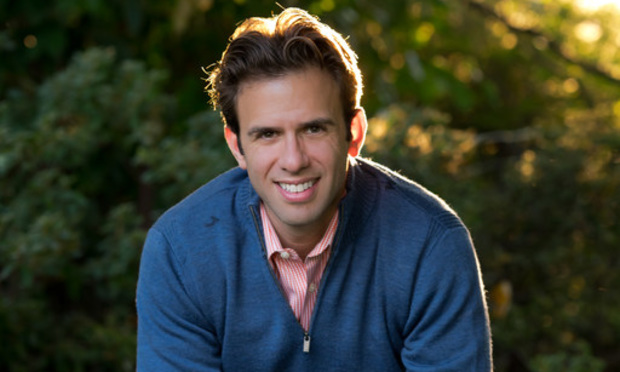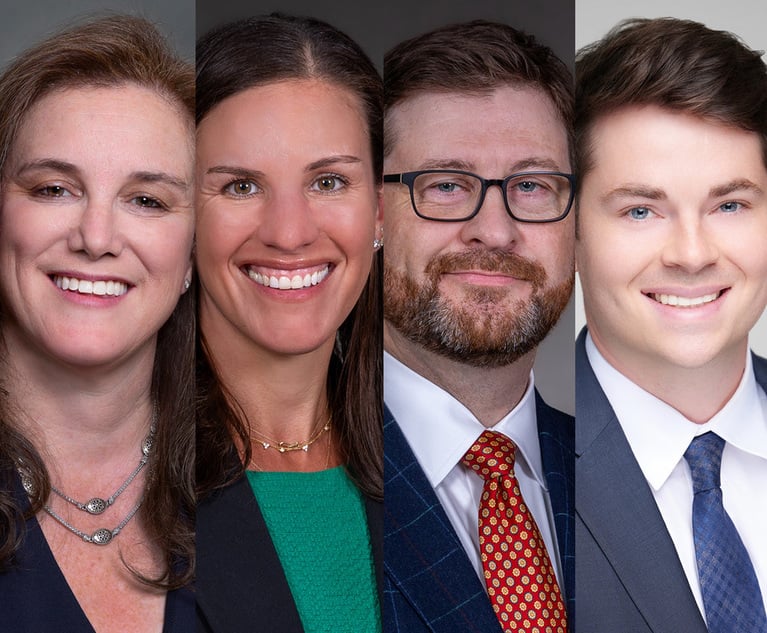The Curious Case of the Tongue-Tied Law Firm
We are rarely at a loss for words when it comes to advocating for our clients. For them, we rarely leave any stones unturned or inconsistencies in their adversaries' arguments unhighlighted.
March 07, 2019 at 12:23 PM
7 minute read
 Wayne Pollock.
Wayne Pollock.
We attorneys are a funny bunch.
We are rarely at a loss for words when it comes to advocating for our clients. For them, we rarely leave any stones unturned or inconsistencies in their adversaries' arguments unhighlighted.
We do not hesitate to use every word allotted to us when we advocate for our clients in writing, nor do we let many seconds pass unutilized when we are arguing our clients' cases in open court.
And we sure as heck do not miss opportunities to respond to allegations made against our clients when we are given those opportunities to do so.
But a funny thing happens when the spotlight shines on us and on allegations that we or our firms acted improperly because of things we or our firms allegedly did or did not do.
More times than not, we are speechless. We mute ourselves. We make no public statements. We decline to comment.
Yes, the same kind of people who will write a four-page letter to communicate a thought that could have been communicated in only three paragraphs, are suddenly, inexplicably, tongue-tied.
If we say anything, it is often days or even weeks after those allegations were first made public.
Law firm sued by clients for billing (hundreds of) hours unnecessarily? Radio silence.
Law firm sued by a client regarding a conflict of interest between that client and another client? Crickets.
Law firm sued for sexual or racial discrimination? Normally silence, but more recently firms have been able to eek out short statements that often ignore the allegations and speak in general terms about those firms' cultures.
Law firm or its attorneys reprimanded by a judge regarding unsavory litigation tactics? More radio silence.
Law firm's internal investigation report for a client publicly criticized as false, misleading or incomplete? More crickets.
Time and again, attorneys and their firms fail to defend themselves publicly against any number of allegations that paint them and their firms in an unfavorable light.
I am not going to speculate about why attorneys and firms decide to go this route. (Spare me any references to ethics, defamation or “letting our work speak for itself.” Attorneys and law firms looking for an excuse to not do something will always find one—no matter how unfounded and unpersuasive that excuse might be.)
The “why” isn't the problem.
The consequences of going this route are the problem.
What these attorneys and firms fail to realize is that when they decline to address these allegations and thus decline to tell their side of the story, they are letting other people—their adversaries, reporters, commentators, and other third parties—control the story and frame it in a way that is unlikely to be flattering to those attorneys and firms.
The other shoe drops when that “adverse framing,” if you will, is consumed by groups of people that are vital to the attorneys' and firms' continued prosperity—such as prospective clients and referral sources. If these people are persuaded by this framing and begin to have doubts about whether a particular attorney or firm is still the right one for them, the failure to defend one's self becomes a much bigger—and costlier—problem.
I was reminded of the curious case of the tongue-tied law firm a few weeks back when I read about a politically connected Pennsylvania law firm that recently made an interesting new hire.
In September 2018, this law firm reportedly hired the son of a federal judge.
The problem was that at the time of the hire, the judge was presiding over two active cases in which the firm was involved as counsel to a party in those two cases.
According to media reports, the first time this hiring was disclosed publicly was in an order written by the judge early this past January. He reportedly recused himself a few weeks later. According to these reports, the law firm did not disclose the hiring publicly. Opposing counsel in these cases reportedly had no idea that the judge's son had been hired by the firm.
When asked to comment publicly, one of the firm's managing shareholders declined to provide the date that the judge's son was hired or the reason for the hire. He referred to the judge's disclosure in early January and declined further comment.
And therein lies the rub.
Look—there is a simple, non-nefarious reason for hiring the son of a federal judge that a law firm has two cases before: the law firm thinks the son was a promising young attorney and the firm is satisfied that there are no adverse ethical (and, perhaps, public relations) implications from hiring him.
But at the same time, there is a simple, nefarious reason for hiring the son of a federal judge that a law firm has two cases before: the law firm wants to influence the judge or force him off the cases because of a potential or perceived conflict of interest.
Regardless of what its actual reason was for the hiring, the firm could have released a credible statement describing a non-nefarious reason why it hired this young attorney. That would have been that, and this column wouldn't have been written.
But the firm was tongue-tied and declined to comment. Without any semblance of a public defense, the law firm is practically inviting various members of the public to assume the worst here—that the law firm hired the judge's son to influence these two cases in favor of the firm and its client.
The problem for this law firm is that only a few members of the public need to assume the worst in order for the firm's public silence to backfire.
All it takes is one referral source to be so turned off by the firm's conduct that it refers a large matter to another law firm.
All it takes is one current or prospective client to be so turned off that it takes its business elsewhere.
All it takes is one current or future rainmaker to be so turned off that he takes his talents to another firm.
That is why tongue-tied law firms do more harm than good when they refuse to defend themselves publicly. All of the zealous advocacy they claim to channel for their clients is nowhere to be found when they have the opportunity to zealously advocate on their own behalf.
Luckily, a remedy is close at hand for tongue-tied law firms. By consulting with their hard-working in-house communications people or their outside communications firms, law firms can untie their tongues and tell their side of the story so that those firms can avoid the reputational harm and business harm that often accompanies silence in the face of allegations of wrongdoing or improper conduct.
Perhaps one day we will live in a world without any tongue-tied law firms. Perhaps one day all law firms will see that the benefits of speaking up and defending themselves publicly vastly outweigh the costs of doing so. Perhaps one day law firms will understand that the perceptions of current and future clients, referral sources and employees of those firms impact those firms' growth prospects and profitability.
Until that day comes, expect more cases of the tongue-tied law firm to appear frequently and without warning.
What are you and your firm doing to prevent yourselves from contracting such a case?
Wayne Pollock is the founder and managing attorney of Copo Strategies in Philadelphia, a national legal services and communications firm. Attorneys and their law firms engage Copo Strategies when they want to ethically, strategically, and proactively tell their stories—and their clients' stories—to key audiences such as the media, referral sources, and prospective clients. Contact him at 215-454-2180, [email protected], or @waynepollock_cs on Twitter.
This content has been archived. It is available through our partners, LexisNexis® and Bloomberg Law.
To view this content, please continue to their sites.
Not a Lexis Subscriber?
Subscribe Now
Not a Bloomberg Law Subscriber?
Subscribe Now
NOT FOR REPRINT
© 2025 ALM Global, LLC, All Rights Reserved. Request academic re-use from www.copyright.com. All other uses, submit a request to [email protected]. For more information visit Asset & Logo Licensing.
You Might Like
View All


Trending Stories
- 1Navigating AI Risks: Best Practices for Compliance and Security
- 220 New Judges? Connecticut Could Get Wave of Jurists
- 3Orrick Loses 10-Lawyer Team to Herbert Smith in Germany
- 4‘The US Market Is Critical’: KPMG’s Former Head of Global Legal Services On the Legal Arm of the Big Four Firm Entering the US
- 5Justice Marguerite Grays Elevated to Co-Chair Panel That Advises on Commercial Division
Who Got The Work
J. Brugh Lower of Gibbons has entered an appearance for industrial equipment supplier Devco Corporation in a pending trademark infringement lawsuit. The suit, accusing the defendant of selling knock-off Graco products, was filed Dec. 18 in New Jersey District Court by Rivkin Radler on behalf of Graco Inc. and Graco Minnesota. The case, assigned to U.S. District Judge Zahid N. Quraishi, is 3:24-cv-11294, Graco Inc. et al v. Devco Corporation.
Who Got The Work
Rebecca Maller-Stein and Kent A. Yalowitz of Arnold & Porter Kaye Scholer have entered their appearances for Hanaco Venture Capital and its executives, Lior Prosor and David Frankel, in a pending securities lawsuit. The action, filed on Dec. 24 in New York Southern District Court by Zell, Aron & Co. on behalf of Goldeneye Advisors, accuses the defendants of negligently and fraudulently managing the plaintiff's $1 million investment. The case, assigned to U.S. District Judge Vernon S. Broderick, is 1:24-cv-09918, Goldeneye Advisors, LLC v. Hanaco Venture Capital, Ltd. et al.
Who Got The Work
Attorneys from A&O Shearman has stepped in as defense counsel for Toronto-Dominion Bank and other defendants in a pending securities class action. The suit, filed Dec. 11 in New York Southern District Court by Bleichmar Fonti & Auld, accuses the defendants of concealing the bank's 'pervasive' deficiencies in regards to its compliance with the Bank Secrecy Act and the quality of its anti-money laundering controls. The case, assigned to U.S. District Judge Arun Subramanian, is 1:24-cv-09445, Gonzalez v. The Toronto-Dominion Bank et al.
Who Got The Work
Crown Castle International, a Pennsylvania company providing shared communications infrastructure, has turned to Luke D. Wolf of Gordon Rees Scully Mansukhani to fend off a pending breach-of-contract lawsuit. The court action, filed Nov. 25 in Michigan Eastern District Court by Hooper Hathaway PC on behalf of The Town Residences LLC, accuses Crown Castle of failing to transfer approximately $30,000 in utility payments from T-Mobile in breach of a roof-top lease and assignment agreement. The case, assigned to U.S. District Judge Susan K. Declercq, is 2:24-cv-13131, The Town Residences LLC v. T-Mobile US, Inc. et al.
Who Got The Work
Wilfred P. Coronato and Daniel M. Schwartz of McCarter & English have stepped in as defense counsel to Electrolux Home Products Inc. in a pending product liability lawsuit. The court action, filed Nov. 26 in New York Eastern District Court by Poulos Lopiccolo PC and Nagel Rice LLP on behalf of David Stern, alleges that the defendant's refrigerators’ drawers and shelving repeatedly break and fall apart within months after purchase. The case, assigned to U.S. District Judge Joan M. Azrack, is 2:24-cv-08204, Stern v. Electrolux Home Products, Inc.
Featured Firms
Law Offices of Gary Martin Hays & Associates, P.C.
(470) 294-1674
Law Offices of Mark E. Salomone
(857) 444-6468
Smith & Hassler
(713) 739-1250






